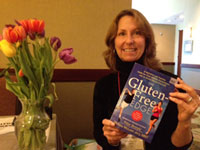
Did you know that 1 in 100 Americans have celiac disease and most don’t know it? And that celiac disease is 5 times more common now than 50 years ago? And that osteoporosis and anemia are the two most common adult presentations of celiac disease?
I recently attended a great talk on gluten by Melissa McLean Jory, MNT. Melissa was one of the many great speakers at the annual NANP/National Association of Nutrition Professionals conference in San Francisco. Her talk was titled The Gluten-Free Edge: Digestive Health and Sports Nutrition for Active People.
Melissa said this: “There is no biological value in gluten” – for anyone! I find this so interesting because I’m beginning to think the same thing. In fact, I find that the majority of my clients with mood problems do better on a gluten-free diet.
Gluten can affect you in so many ways, whether you have celiac disease or gluten sensitivity. Melissa shared this list of gluten-related disorders:
- Depression and anxiety, social phobia, schizophrenia […I added the last three here]
- Gastrointestinal problems, nutrient deficiencies, fat malabsorption
- Neurological complications, fatigue, headaches, ataxia, peripheral neuropathy, poor concentration
- Dermatitis herpetiformis, skin rashes, vitiligo, alopecia
- Dental enamel abnormalities, canker sores
- Anemia (iron, B12, folic acid deficiencies)
- Osteoporosis, osteopenia, arthritis, Dupuytren’s contracture, bone abnormalities
- Reduced fertility in men and women, recurrent miscarriages
- Endocrine conditions, type 1 diabetes, thyroid disease, Addison’s disease
What was new to me and fascinating was the athlete-gluten-performance connection that Melissa refers to as the “Gluten-Free Edge”. Over 60% of endurance athletes experience digestive problems such as abdominal pain and discomfort, diarrhea, constipation, gas and bloating. And because gluten causes inflammation, this can inhibit athletic performance and impair or delay recovery. The higher the sport intensity, the more likely the problem. Melissa shared that the Garmin Cycling Team went gluten-free for the 2008 season. They were the first pro-team to do so and this is what they found:
- Less bloated and “heavy” feeling
- Mentally sharper
- Fewer stomach problems
- Less stress on the immune system
- Stronger performances
Wow! As Melissa says “Go gluten free – you have nothing to lose and everything to gain!”
Here is information on how to do a gluten elimination challenge. I suggest you try it and see how you do
Melissa is wonderful and is so passionate about sharing this information. From her website: “I am Nutrition Therapist, have a degree in Exercise Science, am certified to teach yoga, and have a personal interest and expertise in celiac disease, gluten sensitivity, and holistic health. I’m on a mission to increase awareness of celiac disease and help people navigate the gluten-free lifestyle with confidence, strength, optimal nutrition, and renewed vitality. I know how difficult that can be because I have celiac disease and so does my daughter, but with the right lifestyle changes, optimal health is not only achievable, it can be fun and taste good too!”
Melissa’s new book will be available in June and you can preorder it now. I can’t wait to read it! The Gluten-Free Edge: A Nutrition and Training Guide for Peak Athletic Performance and an Active Gluten-Free Life by Peter Bronski and Melissa McLean Jory.
The whole NANP conference was superb! Other highlights included: The Consequences of Undiagnosed Vitamin B12 Deficiency by Sally Pacholok and Clinical Tools for Working with Libido by Bari Mandelbaum, NC, B Sc., I’ll share gems from these and other talks in future blog posts.